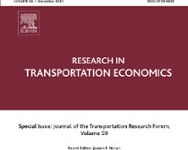Recent Publications
Analyzing Tourists’ Preferences: Milan’s waterway case
The 2020 Italian Spring Lockdown: A Multidisciplinary Analysis over the Milan Urban Area
Estimation of consistent Logit and Probit models using best, worst and best–worst choices
The paper considers random utility models that use a single common vector of random utilities for the computation of best, worst and best–worst choice probabilities, i.e. consistent models. …
Crowdshipping: il potenziale di un sistema di consegna alternativo
Sustainable urban freight transport adopting public transport-based crowdshipping for B2C deliveries
Cities crave innovative logistics solutions dealing with the requirements of the ‘on demand economy’. The paper estimates the willingness to act as a crowdshipper (supply) and to buy a crowd…
Planning with stakeholders: Analysing alternative off-hour delivery solutions via an interactive multi-criteria approach
Many cities of different size and in different areas of the world have successfully tested the introduction of off-hour deliveries (OHD) on a voluntary basis, reporting positive effects, bot…
Public Transport-Based Crowdshipping for Sustainable City Logistics: Assessing Economic and Environmental Impacts
This paper aims at understanding and evaluating the environmental and economic impacts of a crowdshipping platform in urban areas. The investigation refers to the city of Rome and considers …
Special Issue: Urban freight distribution, land use planning and public administration strategies
Well-being and economic growth are strictly correlated. Cities are the engines of an innovation-based economy where research and new ideas are the core input of production. Urbanisation is b…
Special Issue: Urban policy, freight distribution and behaviour change: stakeholders’ engagement, perception and reaction
Freight transport systems are fundamental to guarantee urban sustainable development. In fact, their role is essential in harmonising economic growth while minimising territorial externaliti…
Integrating direct and reverse logistics in a “living lab” context: evaluating stakeholder acceptability and the potential of gamification to foster sustainable urban freight transport
The chapter tests stakeholder acceptability and their likely behavior change with respect to innovative solutions for improving urban freight transport efficiency and fostering city sustaina…
European urban freight transport policies and research funding: are priorities and H2020 calls aligned?
The European Commission (EC) has recently developed a growing awareness and interest with respect to the challenges urban freight transport (UFT) poses. Consequently, the EC has started defi…
Quali sono gli effetti del pagamento del parcheggio sulla scelta modale dei lavoratori? Implicazioni sulle politiche dei trasporti
La gamification per favorire il coinvolgimento e il cambio di comportamento degli stakeholder della logistica urbana
Sustainable crowdshipping using public transport: a case study evaluation in Rome
The paper analyses the willingness to act as a crowdshipper in the case of a last mile B2C e-commerce for pick up/delivery. Specifically, it focuses on crowdshipping services deployed using …
Analisi ex-ante dell’accettabilità e stima dello shift modale di un sistema di road pricing: il caso di Roma
Large cities like London, Stockholm and Milan have adopted traffic policies for their central areas based on charges applying to the inbound car traffic. The paper, after a comparative revie…
Willingness to pay measures to tailor policies and foster stakeholder acceptability in urban freight transport
Policy-making on Urban Freight Transport (UFT) is complex because it requires dealing with heterogeneous stakeholders with different objectives. The often unforeseen and undesired results de…
Special Issue: Freight Behaviour Research
The importance of freight systems to modern economies and as a major source of externalities necessitates achieving a judicious balance between these important aspects. Inducing behavioural …
Special Issue: Urban freight policy innovation: assessment methods
It is foreseen that this Special Issue will lead to an improved understanding of the various policy assessment tools that can be used when evaluating freight systems and supply chains interv…
Special Issue: Urban freight policy innovation: case studies
The main emphasis of the Special Issue is on gaining a deeper comprehension of the policies capable of influencing practices and measuring policy achievements with respect to the objectives …
Using Repeated-Measurement Stated Preference Data to Investigate Users’ Attitudes Towards Automated Buses Within Major Facilities
The paper reports on the results of an investigation about users’ attitudes towards automated and conventional minibuses for routes within major facilities. A common stated preference questi…
Connected shared mobility for passengers and freight: Investigating the potential of crowdshipping in urban areas
Passengers and freight mobility in urban areas represents an increasingly relevant component of modern city life. On one side, it fosters economic growth, but, on the other, it also generate…
Smart urban freight planning process: integrating desk, living lab and modelling approaches in decision-making
This paper proposes an innovative approach to decision-making processes for urban freight planning that could easily be transferred across cities while capable of jointly taking into account…
Investigating the potential for off-hour deliveries in the city of Rome: Retailers’ perceptions and stated reactions
This paper investigates the potential for off-hour deliveries in the city of Rome. It focuses on retailers that play a fundamental role in the decision making process often determining deliv…
Simulating participatory urban freight transport policy-making: Accounting for heterogeneous stakeholders’ preferences and interaction effects
This paper proposes a novel approach to support participatory decision-making processes in the context of urban freight transport through the integration of discrete choice modeling and agen…
Towards a decision-support procedure to foster stakeholder involvement and acceptability of urban freight transport policies
This paper addresses the complex problem of multi-stakeholder decisions in urban freight transport policy-making from a public authority perspective, by proposing a procedure based on a mode…
Role-playing games as a mean to validate agent-based models: an application to stakeholder-driven urban freight transport policy-making
Agent-based models (ABMs) are widely used to replicate transport environments accounting for interaction among stakeholders. Validation of ABMs implies assessing the extent to which the mode…
Measuring the effects of an urban freight policy package defined via a collaborative governance model
In recent years the European Commission has increasingly focused its attention on the development of sustainable city logistics by promulgating legislation and formal directives. Despite the…
Come valutare l’accettabilità delle politiche sulla logistica urbana? Integrazione di modelli di scelta discreta e modelli basati sull’agente
Le politiche per la mobilità urbana sostenibile. Le sfide del futuro
About 70% of the continent’s population lives in European cities; here over 80% of total GDP is generated; about 23% of total CO2 emissions are produced by the transport sector and con…
A behavioral assessment of parking and pricing urban freight transport policies
Decision makers in urban goods movement (UGM) typically need to assess the impact new policy interventions might have on freight distribution. The effects of policy changes are inextricably …
Behavioural implications of non-linear effects on urban freight transport policies: The case of retailers and transport providers in Rome
Cities import goods and freight transport is essential. However, it also generates social costs. Ensuring efficient urban freight transport is important although difficult. Policy makers int…
How good are retailers in predicting transport providers’ preferences for urban freight policies?… and vice versa?
The success or failure of urban freight transport measures crucially depends on local policy makers’ knowledge and awareness of stakeholders’ preferences. The behavioral approach calls for s…
Modelling individual preferences for environmental policy drivers: Empirical evidence of Italian lifestyle changes using a latent class
Degraded air quality severely affects the health of citizens worldwide. The design of effective policies requires exploring public preferences for environmental and air quality policy instru…
Investigating users’ attitudes towards conventional and automated buses in twelve European cities
Driverless buses running in urban low-speed, mixed-traffic conditions are the subject of current research and demonstration in Europe. The paper aims to assess how automation fares with resp…
The Geographies of Air Transport
The book edited by Goetz and Budd represents a timely contribution with respect to an important and critical industrial sector for economic development and well being throughout the world. I…
Urban freight, parking and pricing policies: an evaluation from a transport providers & perspective
This paper investigates transport providers’ preferences for alternative loading bays and pricing policies. It estimates the importance of loading bays, the probability of finding them free …
On finite sample performance of confidence intervals methods for willingness to pay measures
This paper systematically compares finite sample performances of methods to build confidence intervals for willingness to pay measures in a choice modeling context. It contributes to the fie…
Stakeholder-specific data acquisition and urban freight policy evaluation: evidence, implications and new suggestions
Cities, characterised by scarce resources and facing increasing citizens’ requests for more liveable and attractive environments, need to define and implement more efficient urban freight tr…
Analyzing Tourists’ Preferences: Milan’s waterway case
The 2020 Italian Spring Lockdown: A Multidisciplinary Analysis over the Milan Urban Area
Estimation of consistent Logit and Probit models using best, worst and best–worst choices
The paper considers random utility models that use a single common vector of random utilities for the computation of best, worst and best–worst choice probabilities, i.e. consistent models. …
Crowdshipping: il potenziale di un sistema di consegna alternativo
Sustainable urban freight transport adopting public transport-based crowdshipping for B2C deliveries
Cities crave innovative logistics solutions dealing with the requirements of the ‘on demand economy’. The paper estimates the willingness to act as a crowdshipper (supply) and to buy a crowd…
Planning with stakeholders: Analysing alternative off-hour delivery solutions via an interactive multi-criteria approach
Many cities of different size and in different areas of the world have successfully tested the introduction of off-hour deliveries (OHD) on a voluntary basis, reporting positive effects, bot…
Public Transport-Based Crowdshipping for Sustainable City Logistics: Assessing Economic and Environmental Impacts
This paper aims at understanding and evaluating the environmental and economic impacts of a crowdshipping platform in urban areas. The investigation refers to the city of Rome and considers …
Special Issue: Urban freight distribution, land use planning and public administration strategies
Well-being and economic growth are strictly correlated. Cities are the engines of an innovation-based economy where research and new ideas are the core input of production. Urbanisation is b…
Special Issue: Urban policy, freight distribution and behaviour change: stakeholders’ engagement, perception and reaction
Freight transport systems are fundamental to guarantee urban sustainable development. In fact, their role is essential in harmonising economic growth while minimising territorial externaliti…
Integrating direct and reverse logistics in a “living lab” context: evaluating stakeholder acceptability and the potential of gamification to foster sustainable urban freight transport
The chapter tests stakeholder acceptability and their likely behavior change with respect to innovative solutions for improving urban freight transport efficiency and fostering city sustaina…
European urban freight transport policies and research funding: are priorities and H2020 calls aligned?
The European Commission (EC) has recently developed a growing awareness and interest with respect to the challenges urban freight transport (UFT) poses. Consequently, the EC has started defi…
Quali sono gli effetti del pagamento del parcheggio sulla scelta modale dei lavoratori? Implicazioni sulle politiche dei trasporti
La gamification per favorire il coinvolgimento e il cambio di comportamento degli stakeholder della logistica urbana
Sustainable crowdshipping using public transport: a case study evaluation in Rome
The paper analyses the willingness to act as a crowdshipper in the case of a last mile B2C e-commerce for pick up/delivery. Specifically, it focuses on crowdshipping services deployed using …
Analisi ex-ante dell’accettabilità e stima dello shift modale di un sistema di road pricing: il caso di Roma
Large cities like London, Stockholm and Milan have adopted traffic policies for their central areas based on charges applying to the inbound car traffic. The paper, after a comparative revie…
Willingness to pay measures to tailor policies and foster stakeholder acceptability in urban freight transport
Policy-making on Urban Freight Transport (UFT) is complex because it requires dealing with heterogeneous stakeholders with different objectives. The often unforeseen and undesired results de…
Special Issue: Freight Behaviour Research
The importance of freight systems to modern economies and as a major source of externalities necessitates achieving a judicious balance between these important aspects. Inducing behavioural …
Special Issue: Urban freight policy innovation: assessment methods
It is foreseen that this Special Issue will lead to an improved understanding of the various policy assessment tools that can be used when evaluating freight systems and supply chains interv…
Special Issue: Urban freight policy innovation: case studies
The main emphasis of the Special Issue is on gaining a deeper comprehension of the policies capable of influencing practices and measuring policy achievements with respect to the objectives …
Using Repeated-Measurement Stated Preference Data to Investigate Users’ Attitudes Towards Automated Buses Within Major Facilities
The paper reports on the results of an investigation about users’ attitudes towards automated and conventional minibuses for routes within major facilities. A common stated preference questi…
Connected shared mobility for passengers and freight: Investigating the potential of crowdshipping in urban areas
Passengers and freight mobility in urban areas represents an increasingly relevant component of modern city life. On one side, it fosters economic growth, but, on the other, it also generate…
Smart urban freight planning process: integrating desk, living lab and modelling approaches in decision-making
This paper proposes an innovative approach to decision-making processes for urban freight planning that could easily be transferred across cities while capable of jointly taking into account…
Investigating the potential for off-hour deliveries in the city of Rome: Retailers’ perceptions and stated reactions
This paper investigates the potential for off-hour deliveries in the city of Rome. It focuses on retailers that play a fundamental role in the decision making process often determining deliv…
Simulating participatory urban freight transport policy-making: Accounting for heterogeneous stakeholders’ preferences and interaction effects
This paper proposes a novel approach to support participatory decision-making processes in the context of urban freight transport through the integration of discrete choice modeling and agen…
Towards a decision-support procedure to foster stakeholder involvement and acceptability of urban freight transport policies
This paper addresses the complex problem of multi-stakeholder decisions in urban freight transport policy-making from a public authority perspective, by proposing a procedure based on a mode…
Role-playing games as a mean to validate agent-based models: an application to stakeholder-driven urban freight transport policy-making
Agent-based models (ABMs) are widely used to replicate transport environments accounting for interaction among stakeholders. Validation of ABMs implies assessing the extent to which the mode…
Measuring the effects of an urban freight policy package defined via a collaborative governance model
In recent years the European Commission has increasingly focused its attention on the development of sustainable city logistics by promulgating legislation and formal directives. Despite the…
Come valutare l’accettabilità delle politiche sulla logistica urbana? Integrazione di modelli di scelta discreta e modelli basati sull’agente
Le politiche per la mobilità urbana sostenibile. Le sfide del futuro
About 70% of the continent’s population lives in European cities; here over 80% of total GDP is generated; about 23% of total CO2 emissions are produced by the transport sector and con…
A behavioral assessment of parking and pricing urban freight transport policies
Decision makers in urban goods movement (UGM) typically need to assess the impact new policy interventions might have on freight distribution. The effects of policy changes are inextricably …
Behavioural implications of non-linear effects on urban freight transport policies: The case of retailers and transport providers in Rome
Cities import goods and freight transport is essential. However, it also generates social costs. Ensuring efficient urban freight transport is important although difficult. Policy makers int…
How good are retailers in predicting transport providers’ preferences for urban freight policies?… and vice versa?
The success or failure of urban freight transport measures crucially depends on local policy makers’ knowledge and awareness of stakeholders’ preferences. The behavioral approach calls for s…
Modelling individual preferences for environmental policy drivers: Empirical evidence of Italian lifestyle changes using a latent class
Degraded air quality severely affects the health of citizens worldwide. The design of effective policies requires exploring public preferences for environmental and air quality policy instru…
Investigating users’ attitudes towards conventional and automated buses in twelve European cities
Driverless buses running in urban low-speed, mixed-traffic conditions are the subject of current research and demonstration in Europe. The paper aims to assess how automation fares with resp…
The Geographies of Air Transport
The book edited by Goetz and Budd represents a timely contribution with respect to an important and critical industrial sector for economic development and well being throughout the world. I…
Urban freight, parking and pricing policies: an evaluation from a transport providers & perspective
This paper investigates transport providers’ preferences for alternative loading bays and pricing policies. It estimates the importance of loading bays, the probability of finding them free …
On finite sample performance of confidence intervals methods for willingness to pay measures
This paper systematically compares finite sample performances of methods to build confidence intervals for willingness to pay measures in a choice modeling context. It contributes to the fie…
Stakeholder-specific data acquisition and urban freight policy evaluation: evidence, implications and new suggestions
Cities, characterised by scarce resources and facing increasing citizens’ requests for more liveable and attractive environments, need to define and implement more efficient urban freight tr…







